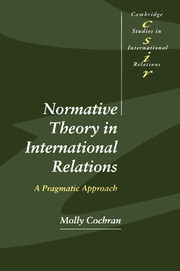Book contents
- Frontmatter
- Contents
- Acknowledgements
- Abbreviations
- Preface
- Introduction
- Part I Evaluating the impasse
- 1 Cosmopolitanism: Rawlsian approaches to international distributive justice
- 2 Communitarianism: Michael Walzer and international justice
- 3 Beyond the impasse? Hegelian method in the cosmopolitanism of Andrew Linklater and the Communitarianism of Mervyn Frost
- Part II Confronting the impasse
- Part III International ethics as pragmatic critique
- Conclusion
- References
- Index
- CAMBRIDGE STUDIES IN INTERNATIONAL RELATIONS
1 - Cosmopolitanism: Rawlsian approaches to international distributive justice
Published online by Cambridge University Press: 22 September 2009
- Frontmatter
- Contents
- Acknowledgements
- Abbreviations
- Preface
- Introduction
- Part I Evaluating the impasse
- 1 Cosmopolitanism: Rawlsian approaches to international distributive justice
- 2 Communitarianism: Michael Walzer and international justice
- 3 Beyond the impasse? Hegelian method in the cosmopolitanism of Andrew Linklater and the Communitarianism of Mervyn Frost
- Part II Confronting the impasse
- Part III International ethics as pragmatic critique
- Conclusion
- References
- Index
- CAMBRIDGE STUDIES IN INTERNATIONAL RELATIONS
Summary
Introduction
Cosmopolitans seek to interrogate and complicate the value conferred upon sovereign states in the contemporary international system, since cosmopolitans take individuals, not states, to be the starting point for moral consideration. They question the way in which boundaries of state authority serve as the boundaries of obligation owed among individuals in international practice. For example, cosmopolitans would challenge the claim of a particular state that the poor in the moral void outside its boundaries are not its responsibility. They do not accept that, at best, these poor can only hope to be the beneficiaries of charitable aid that flows across boundaries. For cosmopolitans, what is at issue here is the possibility of justice in an international system of states.
For cosmopolitans, to think about justice requires that we look past privileged practices and institutions, relinquish the power invested in these social constructions, and consider the simple question of what kind of relations between individuals can be said to be reasonable or fair. Accordingly, the question that considerations of justice raise for international practice is whether states represent a privileged power practice and whether they, like individuals, should be the subject of an inquiry into justice. In exploring this line of inquiry, I will concentrate upon cosmopolitan approaches which follow out of the work of John Rawls.
By choosing this focus, I do not intend to suggest that all conceptions of justice among cosmopolitans are to be identified with a Rawlsian approach.
- Type
- Chapter
- Information
- Normative Theory in International RelationsA Pragmatic Approach, pp. 21 - 51Publisher: Cambridge University PressPrint publication year: 1999

